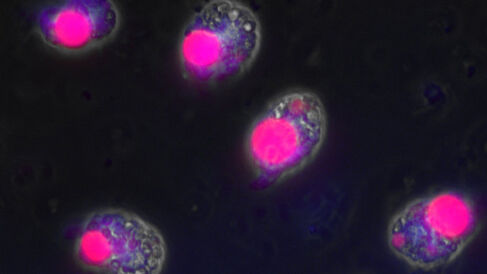
The Nisbet, Howe and Waller Groups are part of an international consortium that has published a new paper detailing the genetic transformation of many marine microbial species for the first time.
The oceans cover 70 percent of the Earth's surface and are home to an astonishing diversity of microbial life. Over the past 16 years, the Gordon and Betty Moore Foundation's Marine Microbiology Initiative has funded researchers around the world to identify marine microbes and learn how they interact with each other and the ocean environment. More than 100 of these scientists, including many researchers from our Department, have now published a major compilation of protocols for performing genetic experiments on marine microbes as a resource article in the journal Nature Methods. These techniques are an essential step forward in understanding the cellular instructions that underpin microbial life in the sea.
A persistent bottleneck in microbial oceanography is the lack of experimental model systems; well-studied organisms that can be genetically manipulated to reveal gene function and expression as well as clarify how microbes contribute to ecosystem processes. One of the Marine Microbiology Initiative's major funding strategies was therefore a $15 million investment to support development of genetic tools for marine micro-eukaryotes (protists), which are among the most diverse yet least understood marine microbes.
The Initiative's experimental model systems portfolio offered a new way to catalyze genetic tool development in the marine microbial ecology research community. The high-risk nature of this work and challenges with securing funding, specifically focused on developing research tools, had previously restricted researchers from making progress in this area.
Dr Ellen Nisbet, a Research Group Leader in our Department and co-first author on the Nature Methods paper, said: "We are very grateful to the Gordon and Betty Moore Foundation for funding this high-risk research over many years. As a result of the research in the Department of Biochemistry, we can now carry out stable genetic modification in dinoflagellate algae, as well as in Perkinsus, an important fish pathogen."
The efforts of the Marine Microbiology Initiative have been accelerated by active communication and collaboration among its researchers. This is exemplified by over 200 laboratory protocols having been shared within a dedicated online community group, Protist Research to Optimize Tools in Genetics (PROT-G).
The Nature Methods article brings together 113 Moore Foundation-supported co-authors from 53 institutions across 14 countries and offers instructions and a wide selection of protocols for conducting genetic experiments in marine protists. All of these protocols are openly available on PROT-G to enable other scientists to benefit from this work.
"The research presented in this paper will have enormous impact on our understanding of marine microbiology," added Ellen. "It will allow us to undertake detailed biochemical analyses of many species for the first time. Very little is known about many marine microbial species, despite their immense environmental and economic importance."
The Gordon and Betty Moore Foundation fosters path-breaking scientific discovery, environmental conservation, patient care improvements and preservation of the special character of the Bay Area. Their Marine Microbiology Initiative seeks to gain a comprehensive understanding of marine microbial communities, including their diversity, functions and behaviours; their ecological roles; and their origins and evolution.
